What Makes A Leader Great?
Top Trending Posts

If greatness as a leader is something you aspire to, we offer 5 orientations that for us, define ‘resourceful’ leaders most able to adapt and navigate the times we live in.
Before we begin, it might be helpful to ask yourself,
“For the sake of what do I want to become a great leader”? And “What constitutes ‘great’ by my own definition?”

Our version of ‘great leader’ involves a willingness to learn and risk one’s identity for the sake of a cause greater than ourselves. We have the privilege of working with leaders as a part of our everyday craft. We coach them, upskill them, challenge them and partner with them as they strive to achieve what’s important for themselves and those they lead. This makes us unique observers of what it takes to be ‘great’.
We begin this exploration by affirming that
Great leaders are great learners.

It is a catchcry of our Programs, and if there’s one trait we look for in the ‘best of the best’, it is the willingness and capacity to learn – not only for the duration of a Program but genuine lifelong learning. The capacity to become a powerful observer of your own habits and tendencies, and place yourself in situations as a willing learner, will manifest how you ‘show up’ as a leader.
Orientation 1 – Cultivating Mood
Cultivating mood lies at the heart of leadership. Moods can be understood as recurrent predispositions for action – meaning, you create a ‘space’ based on the mood you cultivate and how you ‘act’ from this mood. The actions, habits and behaviours you bring to life are full of the expression of the mood you generate.
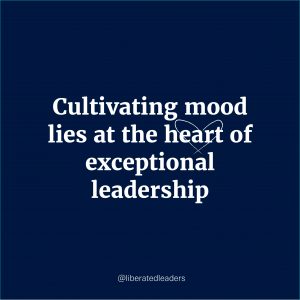
Think of a leader you interact with that seems to regularly be in a negative mood, like resentment or resignation, or one who is perpetually anxious. You may consider these ‘predispositions’ planned or deliberate, but in our work, we have come to understand that this orientation is less of a choice and more of a blindness. In this way, an unhelpful or more ‘negative mood’, has over time, become a part of how they ‘show up’.
Conversely, think of a leader who’s mood you experience as positive. What conditions do they create that has you ‘feel this way’? In our experience, the ‘cultivation of mood’ is more active than passive, and often linked to a more optimistic mindset whereby a leader ‘cultivates’ themselves as a particular observer of possibility and potential. Whatever this kind of leader is doing, they’re in the domain of mood management and creating conditions for the team to do what needs to be done – with drive and ambition.
Moods are strongly linked to the stories and narratives we tell ourselves in everyday life. These same narratives are often reoccurring with an origin deep in our history.
Cultivating constructive moods is not easy work. It requires a deep understanding of self, the narratives that guide how you see yourself, others and the experiences you have as a human being in the role of ‘leader’. It’s brave work. It asks you to investigate that which you’ve taken for granted and to ‘rearrange’ old and unhelpful perspectives for the sake of crafting yourself to be a different observer of yourself and the future you’re creating.
How would you describe the mood you lead from, and if you could choose a mood you’d like to lead from, what would it be?
Orientation 2 – Navigate Breakdowns
What’s the difference between a Manager and a Leader? This question is one we are often asked, and we have a somewhat unique response. We say that Managers are engaged to ‘manage recurrence’ and leaders are engaged to ‘navigate breakdowns’.
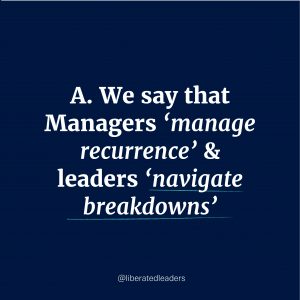
Let us explain. A breakdown happens when we experience an interruption or disruption to the ‘anticipated flow’ of life. The way you ‘observe and interact’ with these very moments and interruptions matters. Breakdowns are part of life and living, and as a leader, your capacity to manage these interruptions and disruptions in a constructive mood sets you apart.
These so called breakdowns happen every day. In the workplace, they can happen when things don’t go the way you think they should – for example, when people don’t meet commitments or when external shocks impact your operations – COVID is one such example.
When it comes to breakdowns, responding well requires that you understand your own tendencies (helpful and less helpful) and reactions when provoked. Declaring breakdowns requires you to engage from a constructive space – even if there’s a concern at the heart of the conversation.
We encourage the leaders we work with to declare breakdowns often and encourage dialogue as frequently as required. This means speaking up around concerns. It can also mean speaking up when opportunities and possibilities are visible and helping steer attention towards these to mobilise your team and move forward. It may help your team pay attention to the disruptive times we are in and take them out of complacency. It may even encourage appropriate challenge and bright minds to get creative (together) and innovate.
What breakdowns are you observing that cause you concern, and what might happen if you shared your concern in a constructive mood?
Orientation 3 – Deliberate Language
In our work, the words we use create our world. This means as leaders, we live in language. Our thoughts and our listening are ways we language, and the quality of both matter.
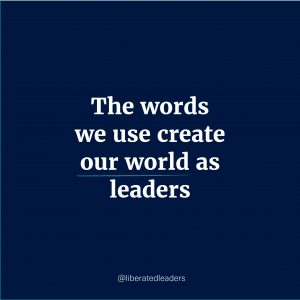
A great leader has explored their biases in listening and can therefore be vigilant in how they listen and onboard all that happens around them. Equally, a great leader has invested time to explore the narrative from which they desire to lead, shedding narratives that no longer serve them.
In our practice, we seek to understand language as ‘generated’ within you, as well as the way language is used (when spoken). When spoken, language becomes a means of articulating and creating the space and conditions for alignment, engagement and team morale.
Being deliberate and aligned in language is a function of both an ‘internal journey’ and the manifestation of that when experienced by others is clear and confident leadership.
How aligned is the story or narrative that guides you with the experience others have when you share your vision as a leader?
Orientation 4 – Driving Accountability
We say that your role as a leader is NOT to manage tasks – your role is to manage commitments and drive a culture of accountability.
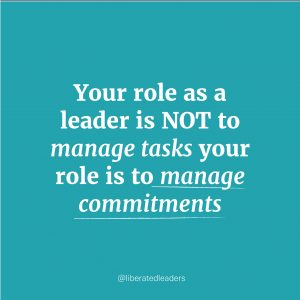
This means engaging in an exchange that has your people take ownership of the commitments they make and take carriage of the delivery on such commitments. This means that the skills of being able to ‘make a request’ and ‘secure a reliable commitment’ are the practices of the more effective leader. This also means that when commitments are not met, there’s a confidence for anyone to have a conversation to explore the gap in expectation and outcome.
Creating a culture of accountability requires that leaders create certain conditions for their teams to perform. Amongst these, there are certain ‘high leverage’ areas of focus.
- Building skills and practices for all team members to make and manage commitments, including skills to converse around all aspects of workflow – especially breakdowns.
- Establishing conditions of safety when people want to speak up, being clear on the conditions and standards expected of each person in each role and normalising the notion of feedback for the sake of collective gain.
- Role modelling. We have a saying that leaders create the weather! To effectively mobilise a culture, leaders must lead from a constructive mood, manage provocation/disruption, sew the desire to learn into the fabric of their organisation and be bold in the way they manage personalities, politics and power!
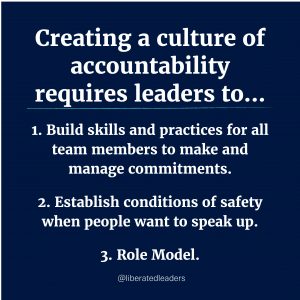
What’s one idea you can bring to life that would move you and your organisation towards a culture of accountability?
Orientation 5 – Anticipating Disruption
If there were a new practice that brings together all we have mentioned in this article, it’s anticipating disruption. Anticipate does not mean predict and control, or scenario plan and overinvest in risk mitigation. Anticipating disruption has a completely different mood about it, the mood of staying open to what may happen and building in responses, conversations and initiatives, to ‘explore’ what you consider might happen in an uncertain climate.
Anticipating disruption as a leader has you share the load, encourage enquiry, explore and experiment in collaboration with your people. This is the space of innovation, and in our work, innovation always involves a constructive mood. Anticipating what’s coming is not burdened by fear but buoyed by possibility.
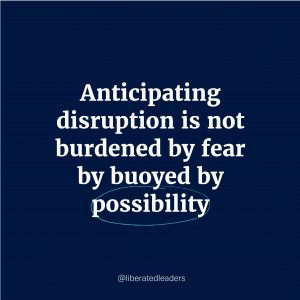
The leader who can create conditions for anticipation knows how to harvest and draw from the potential and possibility within the team, and from the external environments within which disruption can appear. Reading widely, developing diverse networks and continuing to push the boundaries of your own ‘knowledge’ help.
How can you create the space to reflect, explore and extend your ‘network’ as a way of helping you anticipate disruption?
We are Liberated Leaders, and our mission is to help leaders re-invent themselves, their teams and their businesses by adopting new skills and practices to thrive through growth, change and disruption.
We aim to see a world where leaders demonstrate the courage and capability to influence outcomes for people and planet.
If you would like to learn more about our programs, where you can reinvent yourself as a leader then CLICK HERE.
Share This
Top Trending Posts
Sign Up
to our blogs and receive regular updates.

Stay in the Conversation
with Liberated Leaders...






